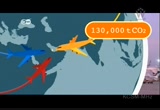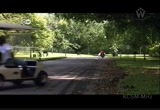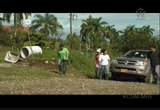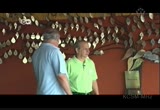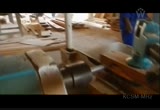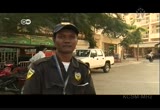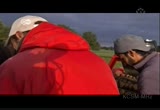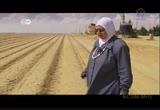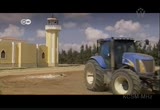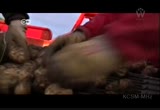tv Global 3000 KCSMMHZ December 3, 2012 2:00am-2:30am PST
2:00 am
>> hello and welcome to global 3000. in a few weeks' time global climate efforts could be on "life support" -- that's because the kyoto protocol -- so far the only legally binding international climate treaty in history -- runs out by the end of the year. delegates from 192 countries are currently meeting in qatar to reach some form of new deal. in today's special programme we focus on the concrete issues behind this latest round of climate negotiations -- and here's what we have coming up -- going green -- costa ricas scientists are working hard to make the whole country co2 neutral.
2:01 am
poor amid riches -- why mozambique's mineral wealth isn't trickling through making the desert bloom -- why egypt is growing organic potatoes in the desert. delegates meeting in doha face many major issues: first of all they have to make sure that the kyoto treaty isn't simply lost when it runs out in december. while working against the clock they are also painfully aware that the world's largest emitters, the united states and china are still not bound to any agreement at all. in turn japan, russia and canada warn that they will not sign any further treaty unless all major polluters come onboard. a tall order for some 20,000 delegates who have travelled to doha, each with their own agenda and issues they want discussed. and while they are meeting right in the middle of the desert, they are doing exactly what they are trying to prevent: producing co2. we explore the environmental
2:02 am
cost of an environmental summit: >> politicians and climate experts are meeting in qatar for the 2012 un climate change conference. but the conference itself will also produce tons of co2. so how climate-damaging is a climate summit? some 25,000 people are expected to attend the conference in qatar. most of them will fly there, generating around 130-thousand tons of co2. that means each participant will generate as much carbon dioxide as a resident of mali produces in five years! in doha, the participants will take buses, taxis and limousines to the conference center. the city is planning to use energy-efficient vehicles, but they'll still produce an estimated 200 tons of co2. and large amounts of electricity will be needed during the 12-day conference itself -- for
2:03 am
lighting and air conditioning, for example. that's another 3500 tons of co2. then there's the refreshments served during breaks. and in the evening, the participants will dine in doha's restaurants and hotels. meat, coffee, wine -- it all has to be produced and prepared, and that adds up to another 800 tons of c02. the overnight stays at the hotel, with air conditioning, hot water for showers and fresh towels every day -- that's another 1800 tons co2. summing up, the twelve-day climate summit in qatar will cause a whopping 136,300 tons of co2. that's about the same amount that the mid-sized city of bochum in germany will generate during the same period of time. and we shouldn't expect much by way of new ideas on climate protection from the conference hosts. the tiny desert nation of qatar tops the world in per capita co2 emissions.
2:04 am
>> a desert nation sitting on seemingly endless reserves of oil and gas might find it hard to see the need to produce sustainable energy. across the ocean meanwhile, a small country is feeling the pinch from climate chang. in costa rica successive droughts followed by heavy rains and storms have convinced the government of the need to act on co2 emissions. costa rica's national development plan wants to see the country become co2 neutral within the next decade. an ambitious aim that has led to a flurry of activity at the "earth university", north of the capital san jose. >> these howling monkeys are native to the costa rica rainforest. these students are visiting with their professor. the earth university students
2:05 am
are here to learn about the rainforest first-hand, instead of from a textbook. >> the palm tree is known for its large leaves, as we can see. they're the world's largest leaves -- a botanical record. >> the earth university campus is a two hour drive northeast of the capital san josé. here the students learn about agricultural and environmental technology -- and they get plenty of hands-on experience here, too. bert kohlmann heads the center for research and development of renewable energy. in less than ten years, costa rica plans to meet all its electricity needs with renewables. >> costa rica has many excellent options when it comes renewable energy -- we have solar energy, geothermal energy, biomass, water power, and wind power. we have all of that here in
2:06 am
costa rica. >> the lectures are in english. around two-thirds of the students come from abroad. >> i come from nicaragua. my name is francisco leiva, and i think with this course i can use all the knowledge to use in my region, because we have a lot of wind energy and also solar energy. >> the students go wherever there's environmental technology -- even on top of a roof. this solar energy unit heats water. >> what i have here is a here is a hand-held infrared thermometer. so if you hold that to the collector and press the button, than you can read, what the
2:07 am
temperature of the collector is at the moment. >> it's registering 35 degrees celcius. >> the entire campus maintains high environmental standards. every newcomer, from students to professors, spends at least one day here, sorting waste. cans and plastic bottles are all recycled. that's good for the environment, because incinerating them would generate harmful co2. organic waste is also important -- when it's returned to the soil as compost, it binds co2. these simple techniques help the university operate in a sustainable and climate-neutral way. >> if you want to become carbon neutral, something very important to look at when you are doing your carbon balances is: what kind of waste are you producing and what are you doing with it.
2:08 am
>> about a quarter of costa rica's population lives in san josé. and only about 25 percent of the plastic bottles used here are recycled. a lot of waste ends up in the river. costa rica has ambitious environmental and climate protection goals, but there's still a long way to go. some students are their way to lomas de l'alegria, south of earth university, for some more hands on experience. they are going to build a simple biogas plant. most of the plant will be built out of used parts -- old buckets will be used to make large pipes. >> this works well in small communities. >> it's a way to build biogas plants, cheaply. >> and this is what the plant looks like when it's finsihed. the waste water generated by this household will be transported through the containers, and bacteria removed.
2:09 am
that will generate methane. >> we're saving about 10,000 colones of gas each month. >> that works out to a savings of about 15 euros. the waste water has been converted into energy. back at the campus. the university also runs a banana plantation. it's also being managed sustainably. the campus plantation will serve as a model for costa rica's large commercial operations. the insects and other small creatures are also important -- they help loosen the soil. the campus plantation also uses as little chemical fertilizer and pesticides as possible. >> most commercial farms would put pesticides within this to kill any insects within the bunches.
2:10 am
we however use a combination of chile and hot pepper. >> the workers also benefit -- they earn more than the local minimum wage, which is equivalent to about 400 euros per month. the bananas are sold abroad. the profits go to fund scholarships for 20 students. it costs about 17,000 euros a year to attend earth university, but only a few students pay the full cost on their own. >> over the years, we have been able to convince friends, donors, companies, governments -- including the german government -- to support an institution like this. to support these kids to come and have this kind of education so that we can break that circle of poverty. we can improve the conditions and they can improve their family, their community, their countries. >> in return, they're now
2:11 am
recording a video message -- a message of thanks from 400 students and professors from 30 different countries, which will go out to friends and supporters the world over in time for christmas. >> while environmental protection helps to drive economic development in costa rica, the discovery of large oil and gas reserves in mozambique is one of that country's few hopes for prosperity. the large coal mining companies are moving into the country's tete province. so the hope in mozambique is that some of its riches will trickle through to the desperately poor. but so far, the reality is much different. >> these children from capanga are playing on a valuable slice of real estate. it's dry as dust, but underneath the surface lies part of the world's largest coal supply. coal is big business in mozambique -- and the tiny village of capanga is in the way. the goats are still grazing
2:12 am
here -- but that could change. loria macanjo is the village leader. many of the villages in the region have disappeared, but macanjo wants to make sure hers remains. >> we don't want to leave. we've seen what happens to the people who have been resettled. they were promised better houses, but that wasn't the case. and promised jobs, but they're still out of work. they were promised food, because they were moved to a place with poor soil. but they only got food for the first twelve months. >> more than 700 families from the region were moved to cateme, some 40 kilometers away. the main street has a few small shops, but there's no market. >> the farmland they gave us is too rocky to plant anything, and we didn't get the fertilizer they promised us. in our old village we could make a living by farming.
2:13 am
here, that's impossible. and they didn't give us jobs, either. that's why we want to go back to where we came from. we don't want to stay here. >> their former home is now one of the world's largest coal mines. brazilian mining company vale has already excavated nearly 3 million tons of coal from this mine this year alone. it plans to excavate around 2 billion tons of coal from the moatize mine over the next 35 years, only a small percentage of the profits enters the state coffers in mozambique. the mining companies receive generous tax breaks from the government. the country's mineral wealth is practically being given away. alberto vaquina, then the provincial governer and now prime minister, says that was a necessary evil. >> when we were negotating with the companies, mozambique first
2:14 am
had to establish a reputation as a secure investment location. and that meant making concessions, of course. if the mozambique government suddenly changes the rules after making these compromises, that would send a very poor message. we also need investment in other sectors. if we go back on our word, what would they think? >> but the coal boom is transforming some areas of the region. the provincial capital of tete has grown from a sleepy village to a regional powerhouse with more than 180-thousand residents. the transformation is also visible in the city's largest market. once the market sold mainly fruit and vegetables. these days, though, all sorts of goods are sold here. george azibu shows us his stand.
2:15 am
back at home in neighboring malawi, he was unemployed. here in tete, business is thriving. >> the money i receive, i use to buy commodities there in malawi. so my life is now changing just because i can afford some commodities i was lacking before. so i've just even bought some shoes i didn't have before and now i have just bought them. >> but others are being left behind in the coal boom. jaime guta owns one of two carpentry shops in tete. he hasn't received any orders from the large coal companies -- they prefer to buy what they need abroad, in larger quantities. >> the big companies should give us more time for production, and they should be more transparent when it comes to awarding contracts.
2:16 am
on the whole, the population and the small businesses are pleased that major projects like the coal operation have come to tete. but we need to know how to make the best of it -- what opportunities are there, what kinds of services are needed, and what quality is required? >> for these small businesses, and for mozambique as a whole -- the coal is a major opportunity for a poor nation. but as guta notes, the government will need to change the rules of the game to make sure that everyone can profit from the coal boom. >> we'd like to know what you think about globalization. if you want to share your views, you can find our global questionnaire online. and today we hear from coy savan in cambodia.
2:17 am
2:18 am
in cambodia the climate is been changed. the seasons is not ... you never know, you know. some time its hot, sometimes is cold. you never know the season, they been change a lot. it make me happy is about my job. and been watching people walking back and forth and sometimes a lot of motorcycle and a car. sometime i go playing basketball, and volleyball and soccer ball.
2:19 am
that's my free time. in the future i want a better job. i want to be a big people, you know, like those people who have a nice car, nice house, nice place. i want to fly airplanes, you know, see the whole wide world. i want to travel a lot of places, because i have no money, no choice, i got no choice. thank you. >> now you might not be surprised to hear that germans can be pretty picky when it comes to their potatoes. for instance, in winter and early spring time, consumers often prefer them fresh from the fields of egypt, rather than those which have spent months in storage at home. on the other hand, egyptian potatoes put a great strain on the environment.
2:20 am
it takes around 400 liters of water to produce one kilo of potatoes, and they must travel great distances. so the taste for tender potatoes presents a dilemma, in egypt and here in europe. >> christoph schäfer is an organic farmer. he's passionate about his work, and produces 8000 tons of organic potatoes every year. the princess potato is his favorite variety. the wendland region has been known for potato farming for generations. but these days, many of schäfer's princesses land in the pig trough. >> last year, we couldn't sell about 50 to 60% of our product. >> a highway through the desert heading north from cairo -- hend kassab is also a potato expert, but in egypt. she is in charge of crop planning and quality control for the daltex company. it is growing organic potatoes for export to germany in wadi el natrun, 120 kilometers from cairo.
2:21 am
daltex has 88 hectares of land, which it bought from the egyptian government. it is over 40 degrees celcius, which seems rather hot for a potato crop. but the sandy desert is also a good place to grow princess potatoes. and they can be harvested at a time of the year when there aren't any new potatoes in germany. there is one drawback, however -- the fields need to be irrigated, and water is a very valuable resource in egypt. >> the soil has to be damp and wet. so that's what we do. we water the soil, we rrigate the soil, and then we start to. >> meter by meter, the water is turning the sand into fertile soil. the ground water comes from a well 150 meters deep. this is not exactly environmentally sustainable agriculture. meanwhile, back in germany, the discount supermarkets won't
2:22 am
stock christoph schäfer's organic potatoes in the spring because they prefer the potatoes from egypt. >> when we have a dry summer, we only need to irrigate two times to get a good potato harvest. in egypt and other countries, where water is in very short supply, they need to irrigate much more often. >> about 96% of egypt is covered by desert, so irrigation is the only way to carry out large- scale farming. and for egyptians, potatoes are a boon to the economy. the potato fields employ 250 workers. the farm even built a mosque for them. the workers earn 50 euros a week -- that's a good wage in egypt. >> look at fresh potatos coming from egypt, at good prices. and we are helping people work here, you are helping people produce here, you are helping the egyptian economy in return. >> but growing potatoes in the desert takes a lot more water than in germany.
2:23 am
and transporting the potatoes to europe also consumes a great deal of energy. they're fresh and tasty, but egyptian potatoes pay a high price when it comes to environmental impact. christoph schäfer is taking on the egyptian competition. he wants to be able to sell his potatoes in the spring,too. >> we're building a potato warehouse so that we can sell our potatoes year-round. that's our current project. we want to store our own potatoes, and then sell them on the market. >> in cairo, wholesalers go to the al um market to buy potatoes. the shish family has been dealing in potatoes for generations. they prefer to sell to russia and europe, where they get top prices. >> egyptian potatoes are higher in quality. that's been demonstrated by objective criteria. there are quality controls, and in the end it's the customers
2:24 am
who decide which potatoes are better -- the german or the egyptian ones. and the egyptian ones are better. >> in spring 2011, egypt exported ten thousand tons of organic potatoes to germany. in the future, they hope to export even more -- to generate export income and private investments that are sorely needed in egypt's economy. >> these profits come at the cost of the environment. today, agricultural operations already consume eighty percent of the nile's water. the river is egypt's only source of fresh water. many of the products sold in the markets of cairo are imported. that also comes at a price -- today, the average egyptian spends nearly half of their income on food. bread is a staple, but every year egypt has to import seven million tons of wheat. wheat also consumes a great deal of water. but instead of wheat, the water goes to grow potatoes for export. on the global market, profits
2:25 am
govern what gets planted, and daltrex is no exception. the first potatoes are harvested in the spring. they are then stored in refrigerated containers and shipped to europe. because they're organic, european consumers assume they are farmed sustainably. christoph schäfer hopes to educate consumers. his princess potatoes might not be quite as fresh and lovely in the spring as the competition from the desert. but schäfer hopes that environmentally-conscious consumers won't just care about beauty, but about true sustainability. >> a tough choice for consumers, when the environmentally sound choice could kill jobs in egypt. and that's all for today, but please tune in again, one week from now. thanks for watching and bye bye! captioned by the national captioning institute --www.ncicap.org--
67 Views
IN COLLECTIONS
KCSMMHZ Television Archive
Television Archive  Television Archive News Search Service
Television Archive News Search Service 
Uploaded by TV Archive on

 Live Music Archive
Live Music Archive Librivox Free Audio
Librivox Free Audio Metropolitan Museum
Metropolitan Museum Cleveland Museum of Art
Cleveland Museum of Art Internet Arcade
Internet Arcade Console Living Room
Console Living Room Books to Borrow
Books to Borrow Open Library
Open Library TV News
TV News Understanding 9/11
Understanding 9/11

